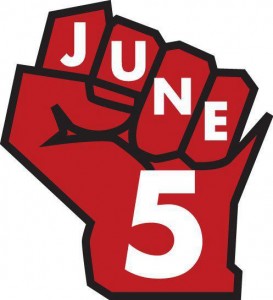The recall is over, and Scott Walker won. 2.4 million people voted, which was a historic, record turnout, far exceeding 2010 numbers (2.1m) though still short of the turnout for the presidential election in 2008 (2.8m).
One of the enduring chants heard by the Wisconsin protesters was, “This what democracy looks like.” That was always true, irrespective of the outcome of the recall election. Had Tom Barrett prevailed last night, there would have been well-deserved triumphalism on the part of the progressive movement about the voice of the people; but the same holds doubly true when you lose, as long as you played by the rules. In a way, the entire point of the recall was the recall itself – the ability of an electorate to hold its politicians accountable.
Wisconsin state law sets a very high threshold for a recall – you need at least 25% of the total number of people who voted in the prior Gubernatorial election (2010) to sign the petition to trigger the recall, which in this case was about 540,000 signatures. The actual number of signatures verified was over 900,000 – about 42%, which is astonishing. FOr comparison, in California the recall threshold was only 12% and they collected about 18%.
Note also that recalls are not like impeachments. Impeachment of a President should only be for “Treason, Bribery, and other High Crimes and Misdemeanors” – and only then after conviction of those crimes (Article II, Section IV). A recall is triggered if you have the signatures, period – because especially given the high threshold, it is implicit that the recall does reflect the Will of the People, and that Will is accorded the benefit of the doubt that it is not frivolous. If a sitting Governor has angered 42% of the voting electorate, then they cannot claim that a recall is a waste of time. It is simply democracy.
That said, Governor Walker actually is under criminal investigation in the so-called “John Doe” case, by both the Milwaukee D.A. and a separate federal investigation. He has denied being the target of the investigation, but transferred $160,000 from his campaign to a legal defense fund, which is only permissible under Wisconsin state law if the investigation does target him specifically. It’s in democracy’s best interest that this investigation take its time and not rush to conclusions, but Walker’s closest aides from his tenure as County Executives have already been indicted. And that’s not the only stain on Walker’s record: there is evidence Walker has rewarded major campaign contributors with plum patronage appointments in his administration. The recall election wasn’t just about political disagreements, but also about valid questions of character, integrity, and corruption.
Walker supporters have claimed that the recall was a waste of time or of money. That’s as false as claiming that a regular election is a waste of time and money – why not just run polls and choose the candidate with the best numbers on election day? Marquette University’s poll with Walker up by 7 points (52-45) was almost perfectly accurate! (The actual outcome was 53-46). This was as valid and necessary an election as any other regular or special election under state law. The outcome of the recall has no bearing on it’s validity; otherwise the recall petition itself would have been sufficient to remove Walker.
And Scott Walker himself agreed – in 2002, as the favored Republican for Milwaukee County Executive, Walker said of recalls:
“You know the folks that were angry about this started a recall and they were told they needed to collect 73,000 signatures in 60 days. Well, not hundreds, not thousands, but tens of thousands of ordinary people did an extraordinary thing. They stood up and took their government back. In less than 30 days they collected more than 150,000 signatures. It was at that moment I realized the real emotion on display in my county wasn’t just about anger. You see, if it had been about anger, it would have been about people checking out and moving out or giving up. But instead what happened was really amazing. You saw people standing up shoulder to shoulder, neighbor to neighbor and saying we want our government back. And in doing so the real emotion on display was about hope.”
I couldn’t agree more – the Wisconsin recall wasn’t just about anger, it was also about hope – that democracy still has meaning, that ideas and people matter, not just cash on hand and ad campaigns. Multiply that sentiment by a factor of ten for June 5th, and savor it.
Of course, cash does matter. However it’s worth noting that the Citizens United decision was not a direct factor in this election. Walker enjoyed a 8-1 money advantage, mostly from out of state, funded by the machinery of the right-wing conservative movement that does seek to impose its vision of illiberal economic feudalism on America. But Walker was not bound by the $10,000 state cap on personal donations because of a loophole in state law that exempts the incumbent. That loophole is as legal as the recall itself, and should be a subject of debate for electoral reform going forward.
And that’s the real fight ahead. As the progressive movement recoups from its loss yesterday, it’s important to remember – this was a battle, not the war. Instead of focusing on effects, we need to focus on causes: money in politics, electoral reform, and true persuasion of the liberal viewpoint to all those folks and neighbors of ours who voted for Walker (and 17% of whom will vote for Obama in November). That’s how you build a movement – by people-power, one person at a time. And one step at a time. This was just the first step.
UPDATE: Though she livesin Alaska and not Wisconsin, Bristol Palin blames the “lamestream media” in my state for misleading people that the Governor was defying the will of the people. I guess we agree to disagree on that, but certainly as an avowed supporter of the will of the people, surely Ms. Palin agrees that the recall was a valid expression of that Will. On that much we surely can agree.











